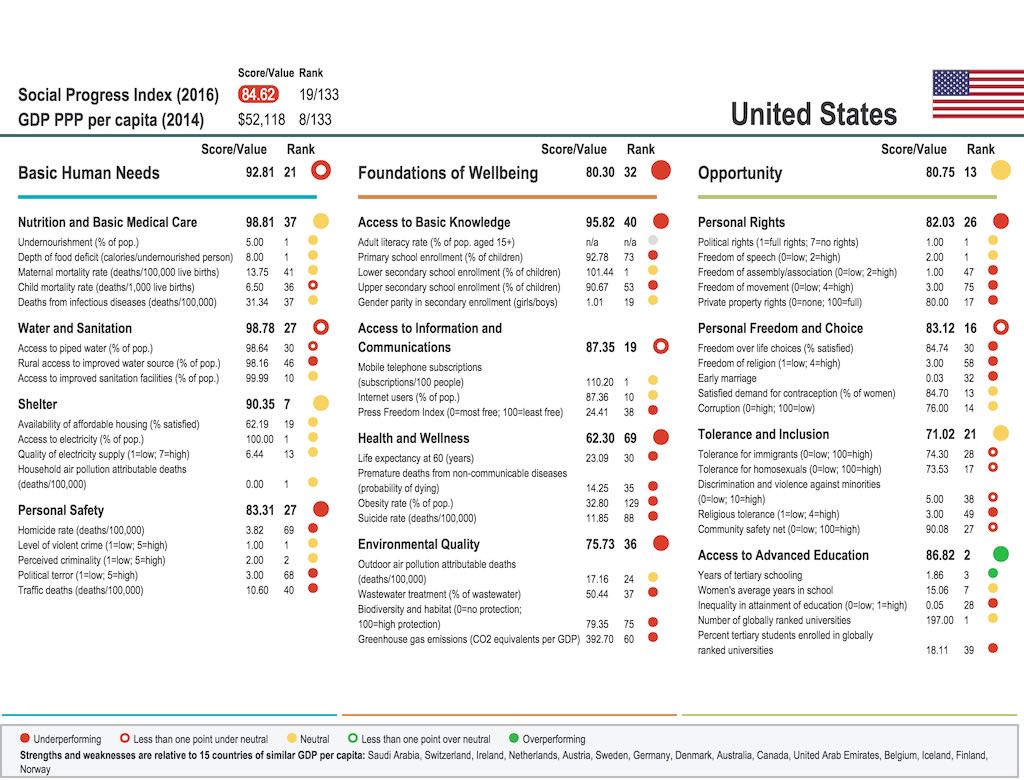The Skoll Foundation is a partner and passionate supporter of the Social Progress Imperative because their work advances our knowledge of how the world is currently faring, based on comprehensive and objective measurement. This week marks the release of the 2016 Social Progress Index, which ranks the performance of 133 countries on their capacity to:
This year’s Social Progress Index provides us with invaluable knowledge. Gun violence has been horrifically prominent in the US media of late, but it is truly shameful to see revealed in the Index the many ways in which American citizens are dying unnecessarily. Despite having the eighth highest GDP per capita, the US ranks 36th in child mortality, 37th in deaths from infectious diseases, 41st in maternal mortality, 69th in homicide rates, and 88th in suicide rates. We can and must do better.

On the other hand, we can draw some optimism from the progress made in Costa Rica. With a per capita GDP roughly one-fifth of the United States’, Costa Rica has the lowest percentage in the world of citizens going hungry and the highest percentages of secondary education enrollment and mobile telephone subscriptions. Costa Rica also scored first on basic personal liberties like freedom of speech, freedom of assembly, and freedom of movement.
The value of the SPI is not only that it sheds light on areas where we as a global community can improve, but—and this is what is most exciting for us at the Skoll Foundation—that we can then pair that intelligence with proven approaches developed by social entrepreneurs. Since 2001, the Skoll Foundation has supported social entrepreneurs whose powerful models for change disrupt a suboptimal status quo and transform our world for the better. Taken together, the SPI and social entrepreneurs provide the practical knowledge that leaders and changemakers require to tackle our world’s most pressing problems.
Consider the work of Living Goods, one of our 2016 Skoll Awardees. Through its networks of health entrepreneurs who go to door-to-door delivering health education and simple treatments, Living Goods and its partner BRAC have been able to cut child mortality by over 25 percent in the areas where they work. How many lives might be saved if this model were applied in countries like Sierra Leone, the Central African Republic, or Chad—countries which the SPI shows are struggling with the highest rates of child mortality?
Or consider Educate Girls and Camfed, both working to ensure that education is a universal right, available equally to girls and boys. Each year, in the countries where they work (Ghana, India, Malawi, Tanzania, Zambia, and Zimbabwe), these two organizations help hundreds of thousands of girls enroll and stay in school. As Togo and Benin look to narrow their gaps in enrollment—from 53 girls per 100 boys in Togo and 68 per 100 in Benin—what lessons can they apply from the models of these successful social entrepreneurs?
As Goethe admonished in Faust: “Knowing is not enough; we must apply. Willing is not enough; we must do.” The Social Progress Index shows us where we can do better in improving healthcare, education, housing, policing, rights, and tolerance. Social entrepreneurs show us how.